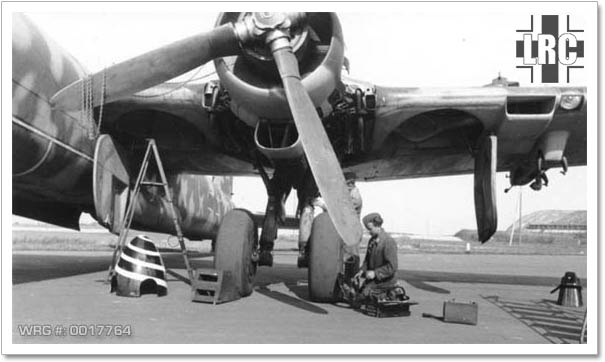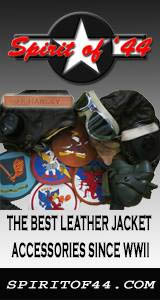Heinkel He 177
Design & Development: Undercarriage
During its initial development, the anticipated weight of the He 177 had increased so alarmingly that the
provision of a main undercarriage design of sufficient strength to handle a 32-tonne (70,550 lb) loaded weight
airframe began to pose a major problem. Neither the engine nacelles nor the wings provided much stowage space
for the main undercarriage members, which needed to be of a longer-than-usual design to allow ground clearance
for the large diameter four blade propellers of the aircraft's powerplants, and after several extremely complex
arrangements had been considered during the aircraft's initial design stages, a rather novel, but still quite
complex, system was adopted.

Heinkel He 177 undergoing maintenance.
[Source: Bundesarchiv, Bild 101I-676-7971A-23/Blaschka/CC-BY-SA]
Instead of the originally projected single wheel leg under each engine nacelle, two massive single wheel legs were
attached to the main spar at each engine nacelle, the outboard legs retracting upward and outward into shallow
wing wells, the inboard legs swinging upward and inward into similar wells in the wing roots, all units being
completely enclosed by flush fitting wheel and strut doors, and almost "meeting" under each engine nacelle when
fully extended. The lever-action lower gear strut sections, on which the wheels were mounted onto their axles,
also had to pivot to a 90° angle (from their 120° angle while fully extended) to the main gear leg during the
retraction cycle, just to fit into their wheel wells.
A more conventional single-leg twin wheel arrangement for each main gear was actually used on the two prototype
examples built (one during the war, one post-war) of the He 274 in France, and a few developments that only
existed as drawings actually had tricycle gear setups being fitted to the Amerika Bomber entry version of the
paper-only He 277, which were also depicted as using single main gear struts with twin wheels. The two hour
time that it could take to change just one damaged main gear tire, using special Heinkel-provided 12-tonne
capacity main gear jackstand blocks, which were in short supply, was just one of the myriad of problems that
the He 177 A's complex main gear format brought about.

Heinkel He 177 undergoing maintenance.
[Source: Bundesarchiv, Bild 101I-676-7971A-23/Blaschka/CC-BY-SA]
Sources:
Gunston, Bill - The Encyclodepia of the Worlds Combat aircraft, 1976, Chartwell Books, Inc., New York
Brown, Eric, Captain - Wings of the Luftwaffe , 1979, Airlife Publishing Ltd., Shrewsbury
, 1979, Airlife Publishing Ltd., Shrewsbury
Gunston, Bill & Wood, Tony - Hitler's Luftwaffe , 1977, Salamander
Books Ltd., London
, 1977, Salamander
Books Ltd., London
Donald, David - The Complete Encyclopedia Of World Aircraft, 1997, Brown Packaging Books Ltd., London
Wikipedia - Heinkel He 177
Gunston, Bill - The Encyclodepia of the Worlds Combat aircraft, 1976, Chartwell Books, Inc., New York
Brown, Eric, Captain - Wings of the Luftwaffe
Gunston, Bill & Wood, Tony - Hitler's Luftwaffe
Donald, David - The Complete Encyclopedia Of World Aircraft, 1997, Brown Packaging Books Ltd., London
Wikipedia - Heinkel He 177






